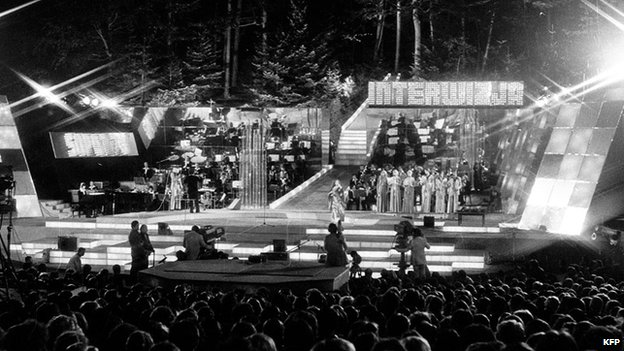As the party prepares to kickoff in Malmo, Sweden, next week, it's pretty clear that nothing compares to Eurovision.
But during the height of the Cold War, a Soviet rival did emerge to challenge the glitz and glamour of the West's Eurovision.
I came across this nugget of Eurovision history through the wonderful SBS documentary The Secret History of Eurovision.
It seems behind the sequins and white suits, there's a lot more to Eurovision than meets the eye.
The Eurovision Song Contest was started in 1956 by the European Broadcasting Union as a way to unite war-torn Europe through light-hearted entertainment.
Proving the Soviet philosophy of "anything the West can do, we can do it better", it launched the Intervision Song Contest. Ok, so originality wasn't necessarily their thing.
Intervision was an evolution of the existing Sopot International Song Festival (held in Sopot, Poland) and, unlike Eurovision, it was held in Sopot regardless of which Soviet state won.
Intervision was staged between 1977 and 1980, but came to an abrupt end when rising unrest in Poland during 1981 made it politically dangerous to stage such a major broadcast.
Interestingly, while Eurovision was only open to Western European countries, in an attempt to make this the world's premier music event Intervision was open to everyone. This saw representatives from the Soviet states perform alongside those from countries like Cuba and Finland.
However, one of the most hilarious aspects of Intervision was that because most citizens behind the Iron Curtain did not have telephones, viewers voted by turning on their lights if they liked the song and turned them off if they didn't.
The fluctuating demand on the electricity network determined the number of points granted to each contestant.
This seems quite an ingenious way of voting in the days before phones, internet and SMS, but surely open to flaws; what if everyone decided to take a toilet break during the same song?
It also seems remarkable that in the Soviet Union, citizens were given a small taste of democracy (albeit in a basic and crude form) where the voice of the people actually mattered and determined the winner.
Surely the organisers of Intervision didn't realise they could be whetting the audience's appetite to have a say in other aspects of their lives.
More than three decades later, even after the fall of the Berlin Wall and disintegration of the USSR, it seems Intervision may rise again.
In 2009, Russian Prime Minister Vladimir Putin proposed to restart the competition, but this time between Russia, China and Central Asian countries.
In the meantime, I'll stick to next week's Eurovision... and I'll be watching with the lights on.

No comments:
Post a Comment